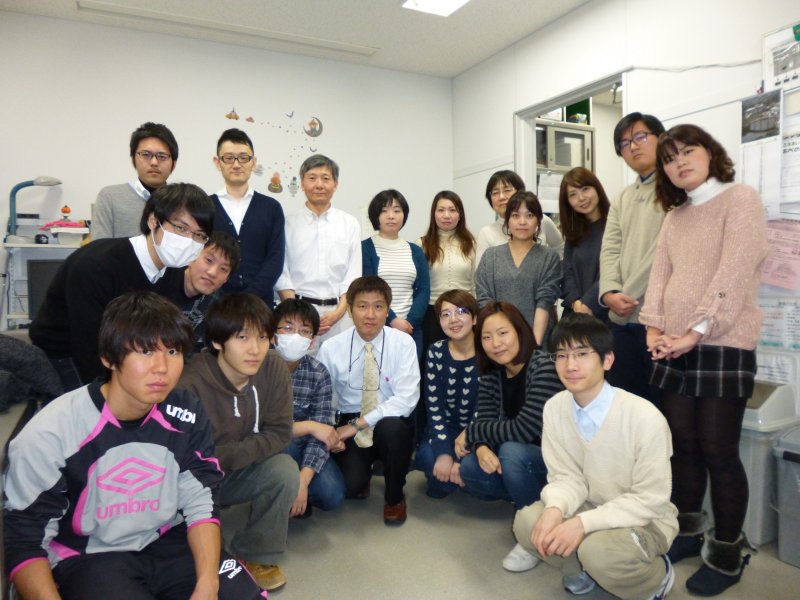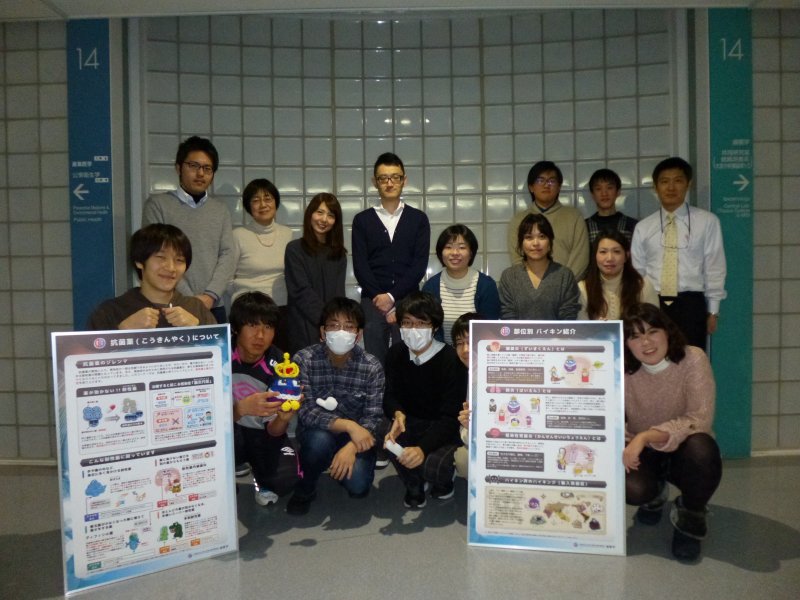Bacteriology
PROFILE
| Name | Bacteriology |
|---|---|
| Chairman |

Professor Yukihiro Kaneko
|
| Contact |
Phone:+81-6-6645-3746 Email:ykaneko@med.osaka-cu.ac.jp |
| Website |
http://www.med.osaka-cu.ac.jp/bacteriology/ |
| Overview |
Our school has basic principles expressed by the word “Chi-Jin-Yu”, meaning “Wisdom, Virtue, and Valor”. Likewise, our department has our own vision expressed by the words, “love, dreams, and happiness.” We would like to contribute to the happiness of all mankind with compassion for others and an inquiring mind as medical scientists. We are currently focusing our efforts to develop a research system that can respond quickly to a variety of bacteriological needs in the medical field. In addition, we are encouraging ourselves to develop novel, creative, and attractive research fields. Educational fields: bacteriology, bacterial infections Bacteriology is one of the fundamental medical sciences, and therefore, it is important for students to learn and memorize things from lectures and textbooks. However, we believe that "awareness" by the students themselves is more important than just giving them knowledge of bacteriology. Research fields: intractable bacterial infection, antimicrobial resistance We are investigating the pathogenesis of intractable bacterial infections, including those caused by Mycobacterium tuberculosis, Mycobacterium avium, Acinetobacter spp., Pseudomonas aeruginosa, and Klebsiella pneumoniae. Our goal is to develop new treatment strategies against those infections. 1. Verification and characterization of novel antimicrobial and antiviral compounds produced by marine microbes: We have developed a method for isolating microbes from the marine environment that is based on electrochemical, statistical, and mathematical concepts. By using this technique, we have already isolated many novel bacteria from the deep sea. We have also shown that some of them produce novel chemical compounds that show antimicrobial activity against extensively drug-resistant bacteria, such as methicillin-resistant Staphylococcus aureus (MRSA) and vancomycin-resistant enterococci (VRE). We are currently working on verification and characterization of a biologically active agent (anti MRSA-VRE) by means of fine structure analysis and validation of its specific activity. 2. Molecular biological analysis of extensively drug-resistant bacteria: In the near future, antimicrobial resistance (AMR) will be one of the most serious global problems. In order to prepare ourselves for the forthcoming terrible AMR era, we need to thoroughly investigate microbial drug resistance mechanisms at the molecular level. The microbial strain TAR-001T, a non-pathogenic bacterium obtained from the deep sea, inherently shows resistance to almost all types of antimicrobial drugs. We are interested in why and how such extensively drug-resistant bacteria emerge in the deep sea. We are trying to reveal the drug resistance mechanism of TAR-001T via omics analyses to unveil the secret behind the emergence of multidrug-resistant microorganisms. 3. Molecular genetic analysis of pathogenic microorganism and development of therapeutic agents: Multidrug-resistant Acinetobacter (MDRA) is one of the microorganisms that we need to pay close attention to. During the course of studying the drug resistance mechanism of Acinetobacter, we realized that a mutant A. baumannii strain that had become resistant to colistin, a final weapon against MDRA, exhibited increased sensitivity towards other antimicrobial drugs, a phenomenon known as “collateral sensitivity.” This strain is useful as a sensitive detector of chemical compounds that have potential antimicrobial activity against Gram-negative bacteria. In fact, using our novel screening strategy, we have already succeeded in finding several candidate compounds from our marine bacterial collection, which would never have achieved with standard screening methods. We are hoping to contribute to the development of next-generation drugs with our original idea and resources. 4. Development of new therapeutic strategy for hypervirulent K. pneumoniae infection The increasing incidence of hypervirulent Klebsiella pneumoniae (hvKP) infection is becoming a serious health threat worldwide. These strains produce an abnormal amount of capsular polysaccharide, thus showing the hypermucoviscosity phenotype. Data suggest that the hypermucoviscosity itself is one of the main reasons for their high virulence. We have developed a method to evaluate mucoviscosity of each bacterial strain. We are using this technique to search for an antimicrobial agent that can suppress their capsular polysaccharide production. Our goal is to develop effective anti-virulence therapies for refractory hvKP infection. 5. Analysis of isoniazid resistance mechanism of M. avium Unlike Mycobacterium tuberculosis, which is highly sensitive to the anti-tubercular drug isoniazid (INH), M. avium is known to be inherently resistant to INH. We hypothesize that a hydrazide-hydrolyzing enzyme is one of the reasons for their resistance to INH. In fact, there are reports on discovery of such an enzyme from the 1960’s, but its identity has never been confirmed. We are re-examining this enzyme using our own collection of M. avium clinical isolates to reveal its identity and the physiological relevance. 6. Investigation of the molecular mechanism of quorum sensing in P. aeruginosa The opportunistic human pathogen P. aeruginosa is known to control its own virulence by means of a mechanism called quorum sensing (QS). P. aeruginosa produces acyl-homoserine lactone (AHL) as autoinducer, and when the concentration of AHL reaches a certain threshold, the AHL receptors LasR and RhlR bind AHL and induce expression of hundreds of virulence genes. Despite the importance, the molecular characteristics of RhlR remain largely unknown. We are trying to purify RhlR from P. aeruginosa cells and biochemically characterize it to better understand the QS mechanism in this bacterium. We are hoping to contribute to the development of a practical anti-virulence agent against P. aeruginosa. 7. Evaluation of humoral immunity to M. tuberculosis-specific antigens for novel vaccine development At the moment, BCG is the only available vaccine against tuberculosis (TB). However, its efficacy remains controversial. Although the development of a novel TB vaccine to replace BCG has long been desired, recent vaccine trials focused on cell-mediated immunity have failed to produce promising results. Recently, accumulating experimental evidence has suggested that specific antibodies have a potential role in host defense against M. tuberculosis (Mtb). Vaccination that induces Mtb-specific antibodies on the airway mucosa could be an effective strategy for protection against primary infection prior to Mtb entry into the lung. To establish a basic understanding of humoral immunity against Mtb for the development of TB vaccine, we are analyzing and evaluating longitudinal levels and avidity of immunoglobulin to various tuberculosis antigens compared with bacterial and clinical parameters during treatment. |










